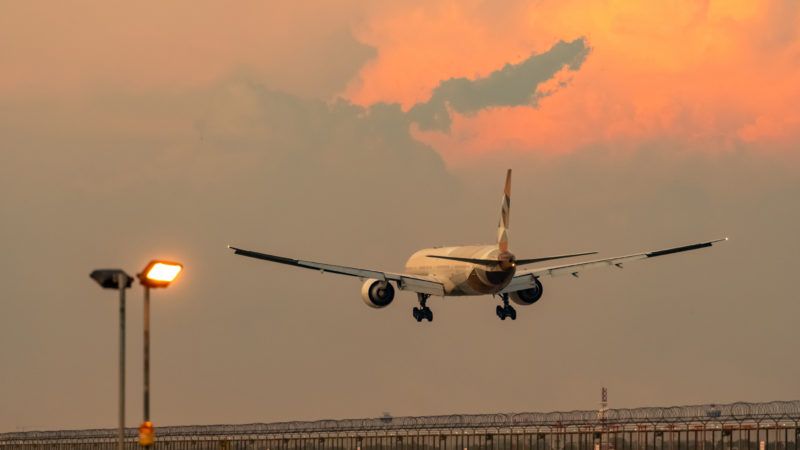Airlines Make Out Like Bandits in $2.3 Trillion Coronavirus Aid Bill
A lot of industries and individuals are suffering right now. A select few corporations are getting big bailouts.

Despite the best efforts of Rep. Thomas Massie (R–Ky.), the House of Representatives just passed the $2.2 trillion Coronavirus Aid, Relief, and Economic Security (CARES) Act by a voice vote. The Senate had already approved the bill by a 96–0 vote on Wednesday, so it now goes to President Donald Trump's desk.
That's good news for the country's airlines, which are set to receive roughly $60 billion in financial assistance.
That includes $32 billion in cash grants to air carriers to prevent employee layoffs, with $25 billion of that going to passenger airlines and $4 billion to cargo carriers. The bill also gives $3 billion for contract workers hired by the airlines. Passenger and cargo carriers will also be eligible for another $29 billion in government loans.
Companies that take advantage of these grants and loans are forbidden from laying off workers or cutting pay through September 30 of this year. They are also barred from buying back their own stock. Executive compensation is also capped at 2019 levels.
This is pretty much everything the industry asked for. The CEOs of 10 major air carriers, including Delta, American, and Southwest, sent a letter to congressional leaders on Saturday asking for $58 billion in aid split evenly between grants and loans.
"We applaud the Administration and the U.S. Congress for reaching agreement on bipartisan legislation intended to assist the U.S. airline industry in continuing to make payroll and protect the jobs of hardworking men and women despite devastating impacts to the industry," declared Airlines for America chief Nicholas E. Calio in a statement after the Senate passed the bill. The unions representing pilots and flight attendants praised the stimulus package as well.
Less pleased is Robert Poole, director of transportation policy at the Reason Foundation (which publishes this website). He argues that airlines do not deserve special treatment.
"The airlines don't have a significant claim that they are a more vital business than railroads, trucking, all sorts of things that make the economy go," says Poole. "All the others don't have a special program."
This line of criticism has been echoed by a range of bipartisan voices. Reps. Justin Amash (I–Mich.) and Alexandria Ocasio-Cortez (D–New York) have both criticized the CARES Act giving too much away to corporations.
This bipartisan deal is a raw deal for the people. It does far too little for those who need the most help, while providing hundreds of billions in corporate welfare, massively growing government, inhibiting economic adaptation, and widening the gap between the rich and the poor.
— Justin Amash (@justinamash) March 25, 2020
.@AOC notes that 13 ppl died in Elmhurst Hospital in NY last night before ripping into $2 trillion bill. "What did the senate majority fight for? One of the largest corporate bailouts…in American history. Shameful. The greed of that fight is wrong, for crumbs for our families!"
— Yamiche Alcindor (@Yamiche) March 27, 2020
Amash has argued against any direct assistance to corporations, saying all aid should be given as cash subsidies to individuals.
Poole thinks loans to businesses—provided they are given at a reasonable rate of interest—are an appropriate way to help otherwise profitable firms injured by government-enforced closures and quarantines. Loans help "separate the wheat from the chaff," says Poole, by targeting aid at companies that actually have a chance of paying taxpayers back. Grants, he says, do a poor job of distinguishing between poorly managed companies that would be in financial difficulty anyway and competently run outfits that need only short-term liquidity to ride out the immediate crisis.
The coronavirus outbreak has radically upended American politics to an almost unthinkable degree. The near-unanimous passage of a $2.3 trillion economic assistance bill is evidence of that. But with corporate special interests extracting the lion's share of benefits coming out of Washington, some things still feel normal.
Rent Free is a weekly newsletter from Christian Britschgi on urbanism and the fight for less regulation, more housing, more property rights, and more freedom in America's cities.


Show Comments (77)